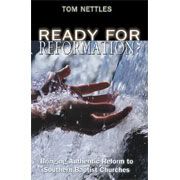Chapters 4 & 5 of Nettles’ book deal with evangelism. Because of the importance of the subject and “the congenital sense of identity Baptists have with it” two chapters are warranted (p. 39). Nettles’ sets the stage for his biblical and historical treatment of the work of evangelism by showing “the danger of a corrupted evangelism” (p. 40). Here are a couple of his astute observations:
“Biblical evangelism cannot be severed from the proclamation of truth. The connection is vital. Sever and die. [This observation in and of itself is an accurate postmortem analysis of what has gone wrong with much modern evangelism.-ta] Ironically, a major factor in the decline of Baptist identity has been the zealous practice of a redefined evangelism. Clearly, zeal may be good or bad depending on the cause to which it is devoted. When devoted to evangelism, it is good; but when the evangelism to which it is devoted takes shortcuts around the gospel, zeal may be a catalyst for theological dissolution” (p. 40).
“A substantial shift in both the theology and methodology of evangelism has occurred, however, and threatens the concept of a regenerate church just as surely as the doctrine of infant baptism. A method of evangelism built on a redefinition of regeneration may produce exactly the kind of carnal membership in churches to which Baptist ecclesiology is hostile. In this approach the ‘work’ of evangelism declines under the pressure of an ‘act’ of evangelism” (p. 40).
In other words, shallow evangelism that sacrifices the truth of the gospel message for the sake of efficiency results in something less than regeneration. Yet, when those who have been so evangelized are pronounced “saved” and baptized into the membership of a local church the result is a “carnal membership.” Isn’t this exactly what has been happening for the last couple of generations in Southern Baptist life? This explains the low level of spirituality that exists in so many churches. This also explains why the majority of the SBC’s 16 million members are “absentee members.”
Nettles appeals to both General and Particular Baptists to illustrate his concerns that evangelism must be wedded to truth. He takes particular note of Samuel Pearce and Andrew Fuller and uses their insights as helpful correctives to the defective evangelism that has affected so much of modern Southern Baptist life.
In the 19th century Baptists were not immune to the new measures controversies that introduced acts of “human contrivance” (as Virginia Baptist pastor, William Fristoe, referred to them) into the work of evangelism and gospel preaching. It was during latter half of this century that many Baptists witnessed a departure from the Fuller-Pearce paradigm of evangelism and the incorporation of the invitation system into evangelistic preaching.
In the 20th century, this unbiblical system became so ingrained into the way most Southern Baptists conceive evangelism that failure to give a post-sermonic “altar call” is now often castigated as anti-evangelistic. Nettles shows how the meaning of “invitation” has completely changed in the Baptist mind from the 18th century to the present. Despite overwhelming evidence that modern evangelistic efforts that employ the invitation system have overrun our churches with a majority of members who are not active in any sense of the word, modern Southern Baptist leaders continue to tout the more zealous employment of such methods as our greatest need.
“This type of evangelism is set forth confidently as the answer to church stagnation among Southern Baptists. Zeal to get more baptisms will heal us, so we have taught and exhorted for decades” (p. 61).
Dr. Nettles assessment explains why many of us are at best tepid about SBC President Bobby Welch’s “Everyone Can and I’m It!” campaign. When declaring his candidacy for president, Welch said, “Here’s the headline on me: This convention does not have one problem that soul-winning will not solve. You put that in big capital letters, quotes, three exclamation points and underline it in red.” No sincere Baptist would ever be against soul winning. But when the KIND of “soul winning” being advocated is that which has filled our churches with a majority of unregenerate members, zeal for it becomes detrimental to the cause of Christ.
Nettles writes,
“Zeal without knowledge, however, kills. Proficiency in provoking decisions has replaced pastoral care and wisdom. Sometimes telling a person how to make a decision may not be evangelism at all. On occasions, encouraging a sinner to continue in pursuit of the grace of God would be more biblical and apostolic (Acts 13:42-43, 48). … Perhaps less baptisms with greater pastoral and church discernment would be better than more baptisms under the same programmatic conditions that have governed the last fifty to seventy-five years” (p. 61).
At this point Nettles sounds very much like the courageous voice of Henry Tucker, editor of the Christian Index and Southwestern Baptist, when he wrote in 1880: “We have been so careless in the reception of members–so anxious to increase in numbers without regard to quality, that the moral tone of many of our churches is utterly debased, and there is not religious power enough to throw off the unworthy load…. When the ‘success’ of a pastor is estimated by the number excluded during his administration, rather than by the number baptized, a new and better era will have dawned. What we need is to unload” (pp. 62-3).
If modern Southern Baptist churches were to heed Tucker’s counsel and “unload,” we would drop from more than 16 million to less than half that number.



























